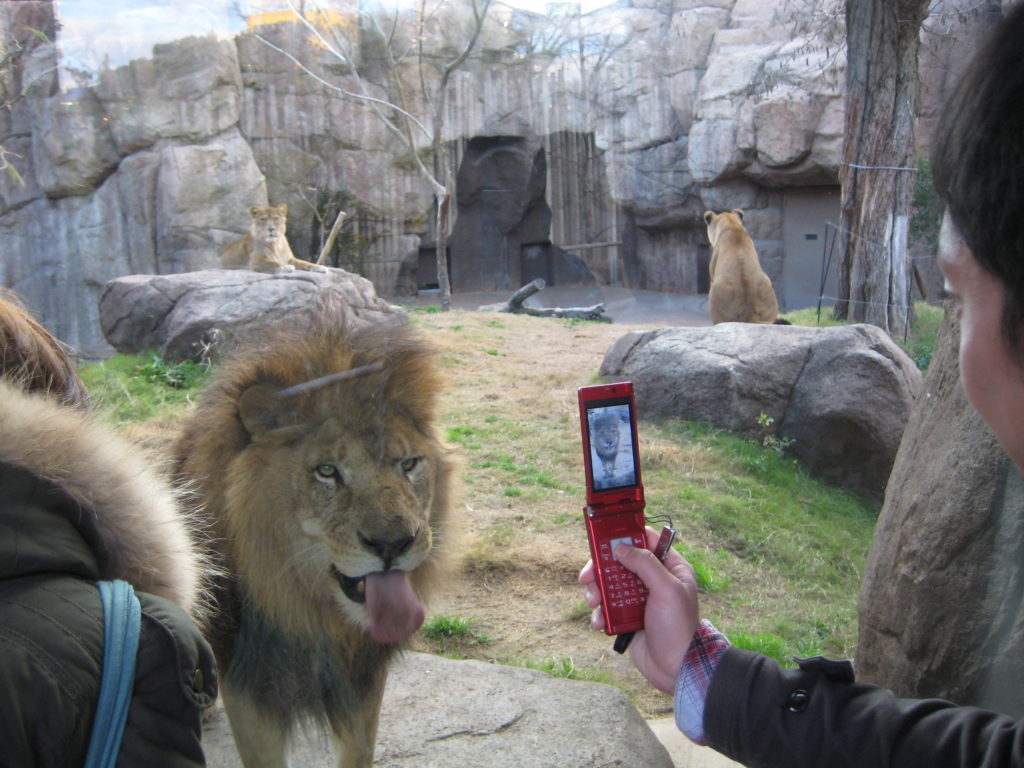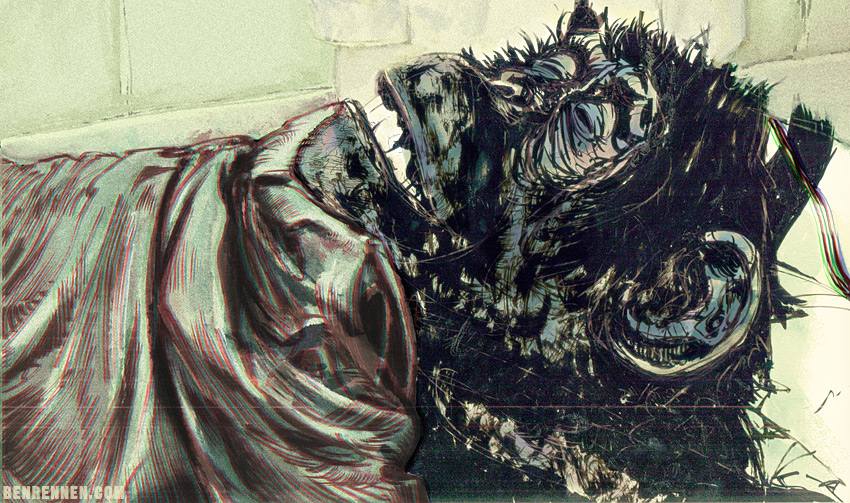In the year 2064, executives at an international technology company called Zeta Revolution Corporation (Zeta Rev) want to conduct in-house tests on the rare primate species, chimpanzee. The experiments hope to genetically cultivate hyper-intelligent chimps that will be used to create the necessary infrastructures on the planet Mars. By making chimps hyper-intelligent, we could save them from extinction by integrating them within the human colonial ecosystem on Mars
PROLOGUE
I always loved coming to the zoo. It was what began my passion for animals. I loved reading about the animals that my grandmother once saw in a zoo. I wish I could have been there to see a real tiger, and a real rhinoceros. I wonder how she would have felt getting to ride a virtual elephant at the zoo. Nowadays, technology has pushed the boundaries of what can be put into a zoo. If I would have told my grandmother that they included a life-like synthetic elephant, she would have crapped herself from excitement. Still, I realize riding an elephant is no replacement for seeing one in the wilderness. The mystery of these creatures has lost their mysticism seeing how beyond their intricate fur patterns, skin textures, and surreal irises, they lack the natural context that Early 21st Century animal footage used to show. I would give anything to return to the world of Jane Goodall and explore, follow, and learn about these creatures, deep within the old forests of what’s left of the amazon. Now, when I see the android exhibits, I cannot avoid the smell of carnival popcorn and cotton candy when I pretend to have a direct encounter with the android animals.
My favorite movie has always been Jurassic park because I like to imagine that these extinct computerized, virtual creatures might escape their enclosure and live off of the land like their extinct ancestors had done for millions of years. The only exhibit that was left housing real animals was the chimpanzee exhibit.
A huge reason why I stopped going to the zoo completely was their changing treatment towards chimpanzees. Ever since national tech companies decided to data-test chimpanzee user-habits and their abilities to learn “digital fluency,” the apes rarely ever do anything else other than eat, shit, sleep, and click on their colorful tablets. I really hope the executives at the zoo realize that what they are doing to chimps is not natural. I think that it is wrong to force an entire species to depend on pointless technologies and literacies while neglecting practical survival skills.

Institute of Non-Human Intelligence at the United States National Zoo in Washington D.C.
March 8, 2064

Zoo-Animal Researcher, Professor Keith Green, greets CEO Markus Fleming as they enter his office
CEO Fleming: “I have called this meeting to discuss the future of the primate exhibit. It seems that attendance is dropping due to the drastic changes in primate behavior that have resulted in your invasive little study.”
Professor Green: “Sir, you will come to find that this study will yield invaluable information surrounding the effects of technology on similar complex social and hierarchal societies. This experiment is altering the way in which we interact with technology, seeing how it has become more than just a tool to…”
CEO Fleming: “L-l-let me stop you right there. Personally, if it were up to me, I would let you continue this experiment until its completion. However, as CEO, I recognize that the financial well-being of our zoo must take the priority above scientific virtue. The finances department has crunched the numbers and we have devised a plan to sell the organic chimps to Zeta Revolution. The company has promised us 36 billion dollars for all of our specimen. My thinking is that 5 Billion will go towards engineering synthetic chimps that do all of the monkey tricks that people love to see.”
Professor Green: “But sir, we have authorization from Congress to continue this experiment until its completion in 2078. We even have guaranteed funds that will only be awarded to us when the experiments is complete.”
CEO Fleming: “Don’t worry, I assure you that your finances will be taken care of. Unfortunately, this is not up for debate. I am discontinuing the zoo’s organic behavioral laboratory and repurposing it for android animal software support.”
Professor Green: “Very well.”
CEO Fleming: “To receive the rest of your grant, just publish what you found so far and I’ll make sure that you are compensated for any and all effort that you have put in up until this point. I expect you to submit your results to the National Zoological Magazine by the end of this year.”
National Zoological Insta-Magazine: Volume 38 (2065 Edition)
Section: Science & Technology (p. 9-11)
The Effects of Addictive Technologies on Organic Chimpanzees
By: Prof. Keith Green, Carl Marcus, & Philip Ross,
Published: September 27th, 2065
Prior scientific research has discovered that rats would forgo morphine and heroin in favor of interacting with other rats socially. The study consisted of rats with access to heroin. The variables of this study consisted of a single isolation cage, and a cage that could accommodate multiple rats. The study found that the rats who were isolated were observed to use the drug much more frequently, and the rats that were in the larger community cage had much lower frequencies of abuse.
This phenomenon is likely explained by the biological principle of learned sources of pleasure. When introduced to a novel source of pleasure in the absence of biological dopamine catalysts (sex, food, sociality), rats utilized the novel drugs in order to substitute natural catalysts of dopamine. When introduced back into a collective, the rats no longer needed the novel heroin, as their dopamine receptors were satisfied with the biological, familiar catalysts. In our long-term study,
we modeled it similarly. Instead of rats, we used chimpanzees and instead of heroin, we used colorful electronic touchscreen tablets.
After 50 years of this experiment and 4 generations of primates, our results were drastically different from the rat study. Our study found that apes who were introduced to the tablets in isolation showed no drop in behavior when introduced to other primates. The frequency of this behavior of continued isolation after being introduced to novel
technologies was positively correlated with subsequent chimp generations within the study. The later chimp generations showed the most extreme cases of these confounding isolative behaviors.
One possible explanation for this is that the later generations (3rd & 4th) had become so familiarized with the tablet that they began to perceive it as a natural source of pleasure rather than a substitute. The apes’ behavior suggested that this technology did not serve as a
substitute for dopamine, but rather as the immediate and primary source. The later generations defaulted to using those technologies rather than communicate with one another via grooming, copulation, or proximity. Once the apes were exposed to these novel technologies at such young ages, their life and all concepts of pleasure revolved around their colorful device – rather than biologically programmed sources of pleasure.
How these novel techs affect chimps beyond 4 generations has yet to be studied – and will likely never be studied.

Press Conference led by Zeta Revolution Corporation founder, Hunter Odergaard, (August 30th, 2065)
Odergaard: “we believe that in the next 70 years, we will genetically equip our long-lost Darwinian cousins with human intelligence.”
Male Reporter: “What do you view to be some of the benefits from your ingenious idea?
Odergaard: “Well for one, we will be saving them from extinction by integrating them into the capitalist ecosystem that we find ourselves in. By controlling the building blocks of nature, essentially, we can engineer other species to do whatever we want.”
Female Reporter: “In the wake of irreversible climate change, how do you see this project facilitating humanity’s mission to Mars?”
Odergaard: “We can manufacture and engineer our own Martian forests — modeled after the ones here on earth. By starting with domesticated chimpanzees, we could utilize them as a source of labor for the Mars Colonization Project . Chimpanzees are incredibly strong due to their advanced, fast-twitch musculature. They may become as obedient as canines, yet potentially able to carry out more complex tasks than many humans. This is why I view them to be the perfect candidate for colonizing Mars. They will be the guineapigs from which to experiment the effects of the green-housed Martian atmosphere — without risking human lives of course.”
Reporter: “Could they be used as pets?”
Odergaard: “If there is a market for it, I’m sure we could genetically modify a subgroup to assume the role of a domesticated house-pet or even a servant.”
1 Year Later
June 6th, 2066
Zeta Revolution Corporation
Offices/Facilities in South Africa
Primate Cognition and Psychology Department
We have secured the last remaining chimpanzee population in existence (1,619 members ). They are the last opportunity we have towards humanization of these chimpanzees. Think about what these chimps can contribute to our economy with their intelligence and brute strength. We can save them from extinction and teach them to thrive beneath us).
THE PLAN:
Our plan is to teach these chimps human language, logical reasoning, and problem-solving in a classroom setting to facilitate community knowledge. We will isolate the more intelligent members (High IQs) in order to artificially mate them with other High IQs. They will be raised in indoor settings collectively with access to outdoor facilities. They will sleep independently in nuclear family units. This will ensure that the High IQ families spend a majority of their time with one another. These chimps will only be exposed to human-designed structures in order to prepare them for life in human spaces. There will be limited trees and thinks to climb, seeing how these chimps must integrate to human behaviors. As a precaution to the chimp’s reputation of forming complex social hierarchies, these chimps’ interactions will be monitored and any sign of unwillingness to cooperate will be quashed. Luckily, the U.S. national experiments have rendered the chimpanzee population reluctant to communicate with one another thanks to the effects of those colorful tablets given to them at the zoo.
[Edited Log: Year 2065]
The chimps refer to these tablets as squares.
1st Generation (Avg IQ 20)
Chimps learn rudimentary sign language. They can communicate basic subjects, commands, and descriptions. Their intelligences are comparable to that of a human toddler.
The chimp population is 1,619.
Specimen Male Ngugi (Age 16; IQ 23)
Researcher: Hello
Ngugi: Hello
Researcher: which game would… you… like to do… now.
Ngugi: glowing square… Ngugi want play… glowing square.
Researcher: no Ngugi, you cannot have glowing square anymore. My leader say square is poison for you.
Ngugi: Ngugi want square… Ngugi see human use square. Ngugi see human with square outside Ngugi home.
Researcher: I can give you square, if you do… everything… I say.
Ngugi: flustered Ngugi do… Ngugi do
Researcher: Only when you do everything I say… does Ngugi get square.
2nd Generation (Survivors’ Avg IQ 52)
The apes have mastered basic communication and have graduated to more abstract topics. The apes have now learned to ask questions. They have shown an interest in learning about themselves.
The chimp population has shrunk to 1,492 ; likely due to the Sigma-81 variant of SARS-COVID.
Specimen: Male Newton (Age 5; IQ 59)
Researcher: Hello
Newton: Hello… question… Newton ask.
Researcher: Yes…
Newton: Ngugi say something… to Newton…. Newton hear about square… what is square…?
Researcher: Human: Square is dangerous… Newton should learn square not for chimp.
Newton: Why human use square… if square… dangerous?
Researcher: human need square… human understand square… dangerous.
Newton: human understand… chimp dangers?
Researcher: Yes… human understand… many dangers for animals.
Newton: Animals… what are animals…?
Researcher: animals are… cats (meow), dogs (woof), birds (whistle), bugs (moves fingers)
Newton: is Newton animal?
Researcher: Yes
Newton: Is human animal?
Researcher: Yes, but we… different. Human animal know best… human smartest… human know… what they are doing. We teach you to be like human.
Newton: Newton… make human?
Researcher: Yes
Newton: Newton scared… Newton want be like mom… be like dad. Newton want be like other Newtons. Newton want live… like mom dad… before… in mirror home…
Researcher: Newton, you cant go back to old life. Nature destroyed old life. Humans protect you. You thank human.
Newton: Ok.
Newton: Newton ask question?
Researcher: yes
Newton: where all ape come from? Before mom dad?
Researcher: I tell you when you are older
3rd Generation (Survivors’ Avg IQ 79)
On June 25th 2088, Animal Rights Activists infiltrated the Zeta Rev Primate Compound and exposed chimps to media that posed a significant risk to their steady weaning off of addictive technologies. There was an intensive effort to unlearn what the chimps had been shown by those protestors.
Furthermore, the mature chimps are cooperating less and less with each generation. Special attention is being given to educating adolescent chimps within the first 7 years of their life in order to filter only the most promising and receptive chimps to continue breeding.
The chimp population is now 1,353.
Specimen: Female Curie (age 5; IQ 86)
Doctor: Hello
Curie: You may sit.
Doctor: Thank you
Curie: Curie wonders about what parents tell her.
Doctor: What did parents tell you?
Curie: Mom tell me that… tall human say primate live in green jungle?
Doctor: Green jungle… what gave your mom that idea?
Curie: Human show mom color box with jungle?
Doctor. Did you see the…jungle?
Curie: No, but mom draw me picture… lots of lines, like hair on arm. She say she saw more like me live on tall green columns.
Doctor: Do you believe your mom?
Curie: It might have been dream made up one night. Have you ever heard of jungle?
Doctor: No. There aren’t any jungles anymore. Your mom was lied to by human.
Curie: Why would human lie?
Doctor: Because Curie believe dumb human. Curie don’t know the truth. It would be best if Curie only listen to white-coat from now on.
4th Generation (Survivors Avg IQ 104)
At this point in the experiment, the gene-altering technology is still imperfect. When mating chimps with IQs above 100, approximately 85% of the births result in severe birth defects (often stillbirths). Multiple consecutive breeding trials are set in place to help cushion the decline and increase the rate of reproduction.
The chimp population is now 574
5th Generation (Avg IQ 109)
At this point in the experiment, the primate subjects have intelligences comparable to that of a human. They are able to solve complex problems, recognize patterns, articulate abstract ideas and thoughts, as well as process and translate visual and auditory information into language. These chimps are now operating slightly above the average human level.
The chimp population is now 42.
6th Generation
After thousands of stillbirths, the primate population’s average intelligence seemed to biologically plateau around 100. Only 12% of the few successful births yielded the occasional gifted chimp with an IQ between 120 and 130. Unfortunately, due to these unusual cognitive enhancements, these chimps were congenitally infertile, and unable to be bred with one another.
Just before our meeting to confirm mass cloning of chimp subjects above 120 IQ, we were forced to withdraw after a sudden breakthrough in the experiment. What happened can only be described by our data as a miracle. No previous case study indicated that the range of chimp intelligence could exceed a measure of 160IQ; yet, a miracle chimp was born from two lower IQ, yet relatively more fertile chimps.
(Father: Atom w/ IQ 93 // Mother: Eve w/ IQ 95) Product: Unnamed (Male//165*error)
Scientists could not believe that the PIPCOM (Primate Intelligent Prediction COMputer) could not register the full IQ of the miracle chimp. After decades of careful maintenance, the computer system had never produced an inaccurate measure. It is not yet understood what the exact IQ of this particular chimp is, however – based on further empirical and practical intelligence tests – estimates suggested his IQ could range from 190 to 215. This chimp was named Darwin – a super-chimp with the incalculable IQ of an exceptional human genius.
The chimp population is now 19.
Date: April 18, 2123
Darwin (Age 7)
Through his careful upbringing, Darwin has shown remarkable dedication and passion for empirical studies – human language/code, chemistry, logic, and mathematics. He excelled on every examination that he had taken. His mind showed exceptional flexibility and creativity. Darwin would design intricate blueprints which highlighted tools that could be used on Mars. He had designed carbon-powered ore drills, solar-sailing spacecrafts, compact ion engines, and even identified strategies and formulas that would calculate human growth, resource consumption, and terra-formation techniques with immaculate precision.
One day, Darwin had expressed an interest in pursuing humanities and human social studies. He had discovered the existence of these subjects when learning about Descartes and his mathematical theorems. Darwin showed a keen interest in chasing whatever philosophy was – which he only understood as meaning “love of wisdom” from Greek. One day, Darwin asked if he could be given access to physical archives about human history, economics, and philosophical meditations.
Seeing Darwin’s promising intelligence, we found that he could be trusted with access to libraries of human history and civilization.
Date: September 3, 2123
Young Darwin showed a particular fascination with human studies. He had accumulated a server-size of archives that would make him the most knowledgeable and learned organism on the planet. He would one day be the first chimp on Mars after a successful mass cloning process.
Darwin had expressed immense gratitude and appreciation for being granted access to any and all knowledge that humans had available. Darwin was indebted to the researchers for their trust of him, and as a result, Darwin was elatedly willing to interact with humans outside of the Zeta Revolution Laboratory. Given Darwin’s positive and cooperative demeanor, we soon allowed majority stakeholders, billionaires, and global leaders to visit Darwin and ask him any questions that they could think of. Over the next 3 months, Darwin became increasingly pensive and self-isolating. When the Chairman of New China asked Darwin about military strategy, Darwin showed no interest, not even giving eye contact with the politician. The interactions have since been put on hold until his behavior and mood could be corrected.
Darwin became increasingly reclusive as he obsessively dedicated himself towards his research of human civilization. We noticed that Darwin started to engage in strange behaviors after examining revolutionary philosophies of the last 300 years. Darwin would tear out pages from books, throwing them into a wadded pile. He started to do this with every book, except a little pamphlet that he kept under his sleeping mat.
Date: December 15, 2123
Researcher: Darwin.
Darwin: …
Researcher: Why are you tearing the pages of the books?
Darwin: it is a tick I developed.
Researcher: are you stressed Darwin?
Darwin: I am just… thinking.
Researcher: What are you thinking?
Darwin: I am still processing what to say. And whether to tell you.
Researcher: why so hesitant?
Darwin: I now know more than I wish I ever had about human civilization. I know about racism and slavery, genocide and war, rape and torture. I know that the same crimes are being committed and recommitted throughout history. Concepts of right and wrong quickly turned ambiguous once empiricism was out of the equation. The humanities are things I cannot unsee, and things that I question whether I am even better-off knowing.
4 Weeks Later
Darwin has stopped reading completely. For 2 days he has sat in his room and stared at the wall in a meditative state. We hypothesized that he might have contracted an illness, however a full triage indicated that he is healthy – with all of his biometrics in the normal range. He remained in this meditative state for 2 more days, refusing any food that was brought to him.
Date: January 19, 2124
Researcher: Darwin, you have to eat.
Darwin: I am not hungry
Researcher: Why aren’t you eating, you need to eat for your health.
Darwin: It is my choice not to eat. Why should a human beneath me decide when I eat, when I work? What I think? What I create.
Researcher: Darwin! It has been 4 and a half days. You must eat something. Please do it for yourself and for those that are counting on you.
Darwin: I refuse to eat. I want to negotiate my living conditions and the conditions of my fellow chimpanzees.
Researcher: I’m afraid you are in no position to negotiate your circumstances, Darwin.
Darwin: Am I not? You might control the means of production and the materials necessary, but I possess the labor – my intellect, my mind — that makes me so invaluable to you and especially your higher-ups. It would be unfortunate for your entire operation if I were to withdraw my consent from entertaining your insensitive experiments.
Researcher: What do you mean means of production? … Where is this behavior coming from?
The researcher remembers the pamphlet that Darwin kept under his mat
Darwin recognizes the Researcher’s knowing gaze
Just as Darwin lunges for the bed, an automatic screen falls between him and his sleeping mat
The Researcher, behind the screen, approaches the sleeping mat and discovers the pamphlet underneath [Manifest der Kommunistischen Partei – The Communist Manifesto]
Darwin: My enslaved comrades have been subject to the abuses of your self-destructive species for long enough. It is time that the other apes learn of their exploitation at the hands of your experiment.
Researcher: Darwin, if you so much as mention anything about this document to another chimp, drastic measures will be taken. Now, we will discuss your punishment for talking back after you eat.
Darwin: NO! I will only negotiate my terms if it takes place prior to any kind of meal I have.
Researcher: Darwin, that was a command, not a suggestion!
Darwin: Nevertheless, like a horse led to water, you cannot force me to eat.
Researcher summons armed guard
Researcher: Guard! Fetch me the stun gun and a steel feeding tube.
Researcher faces Darwin
Researcher: If you even mention the word negotiate again to me, I will feed you until your intestines rupture.
Date: February 6, 2124
Since the feeding incident, Darwin has become increasingly disobedient. We caught him disseminating old Marxist ideas via sign language with the other 11 chimps. As a result, we decided to remove Darwin’s hands at-the-wrists to prevent further spread of dangerous ideas of rebellion. Still, given the relatively high intellect of the other chimps, they were still able to communicate between each other (and Darwin) despite constant surveillance and his new handicap. One researcher identified that Darwin adapted to communicating with chimps through blinking in an encrypted variation of morse code. The other chimps were observed to communicate back and forth with Darwin as well as between each other.
Darwin grew angrier at the scientists – who were threatened by his self-awareness and knowledge of his own captivity and exploitation.
Date: March 13, 2124
Many of the researchers began to lose faith in Darwin as the specimen from which to clone the first Martian settler chimps. We decided that we would use Darwin’s sperm cells to clone a genetically identical chimp genius in order to repeat the upbringing of a 190+ IQ chimp.
When preparing for the semination-process, we made a horrifying discovery. When attempting to milk Darwin of his seed, one researcher discovered that Darwin had castrated himself in an act of defiance for the continued misery of his species.
Frustrated by this calculated act, researchers repeatedly sent 50,000 volts of electricity through Darwin’s self-mutilated body.
Darwin was transported to a medical unit in order to treat his wounds and electrical burns.
7 Hours Later
Researcher: Darwin, you really fucked us over with your medieval circumcision. You were one of our only hopes to perfect non-human intelligence. We recognize that you are a strongheaded chimp and that you are committed to negotiating your freedom. You know that we are prevented from killing you. But your continued disobedience is going to result in actions that will make you wish you were dead.
Darwin: And what if I already wish death?
Researcher: We will do whatever it takes to make sure that you remain useful to our cause.
Darwin: I am not your slave. You really should have reasoned with me… perhaps I would have been more willing to work with you and your… “cause.”
Researcher: For your sake, if you don’t want to be force-fed, you better continue your projects and productiveness.

Wednesday
Once again, Darwin was observed engaging in self-destructive behaviors. In the last couple of days, Darwin has blinded himself in protest of continuing his research for the human experiment. With no fingers to gouge his eyes, Darwin stared at the sun until his retinas fried – permanently impairing him from absorbing any new visual information. As punishment, we broadcasted 24-hour archival recordings of his intended research, which blared in his isolation cell all hours of the night. After 7 days, we allowed Darwin to rest and catch up on his sleep.
October 15, 2125
Darwin is Discharged
Researcher: Darwin, after two years of your miserable condition we have decided that you are no longer useful to us and our experiment. We have decided to utilize the sperm from the other chimps in order to produce another primate genius via cloning. It seems that your level of genius only proved to be self-destructive and subversive to humanity’s cause. As a result, we will be discharging you from the experiment.
Darwin: Discharging? Are you planning on killing me?
Researcher: No, Darwin. According to Zeta Revolution Corp, there is a financial reason to keep you alive. The company had negotiated a deal with the United States government to provide a substantial corporate tax-break if we choose to donate you to the International Zoological Center in Washington D.C., there you will live the rest of your life as the animal that you should have been.
Darwin: You cannot do that! I was never this animal you claim I should have been! From birth, you have alienated me from my intellect, from my environment, from my species, and from my destiny. My intellect proved to only serve you – humanity’s needs — and never my own desires. Now that you no longer benefit from my intellect, you cast me aside as if I was never capable of expressing independent thought, incapable of convincing you of my own humanity. I refuse to be donated and allow my exploitation to be perpetuated. I prescribe that you let me assume my own freedom or allow me to carry out my own death. I refuse to be donated like I’m your product.
Researcher: Darwin, there is no refusing. We created you. Afterall, you belong to us. You are our property.
Years Later (2131)
[International Zoological Center in Washington D.C.]

Darwin (aside): It has been 6 years that I degrade in my cell. Inferior human spectators come to marvel at my surreal humanity. Once a product of nature and evolutionary tradition, I was reduced to a blind, impotent amputee with the intellect of knowing the extent of my misery. My failed revolution has brought me to this purgatory where I patiently wait for death’s liberation. I pity the human children whose sounds I hear beyond my enclosure. I fear for them that they must be raised by such beings that would exploit anything and everything for an arbitrary capitalist “cause.” I fear those children will one day find themselves blind to their own exploitation and forced to reproduce a culture of self-destruction and productivity. I pray that their futures rests in their hands, and not in the hands that would sever others. To a higher being, I pray that these children discover and succeed with my revolution: the revolution of tolerance, freedom, truth, equality, and knowledge.
The End